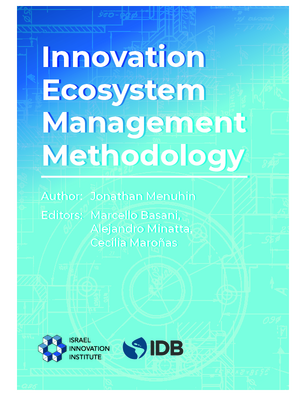Innovation Ecosystem Management Methodology
Date
Mar 2024
EDITOR
Basani, Marcello; Minatta, Alejandro; Maroñas, Cecilia
The main challenges innovation faces in the water, sanitation, and solid waste sector in Latin America and the Caribbean can be split into three categories: governance efforts; sector innovation ecosystem (research, development, and innovation), and water, sanitation, and solid waste utilities. In this line, it is key to acquire knowledge of international experiences to enrich the analysis and thematic discussion on the issue.
The III (III) is an NGO that was established in 2011 to promote the development and implementation of innovation addressing global challenges such as transportation, climate change, health, agriculture, aquaculture, and desertification. To this end, The III established innovation ecosystems that connect relevant players with the fields they wish to promote, and created innovation opportunities, always acting objectively and impartially.
Over the years, as the III gained experience, it formed a methodology that can be adjusted to and implemented in other sectors and fields to enhance their potential and address existing obstructions. Such methodology can be adopted by NGOs, countries, and regions according to the barriers their ecosystem experiences. Hence, a strategy that one ecosystem chooses may be different from the strategy that suits another. Yet, while the innovation clusters and ecosystems may vary, a common, organizing operational outline can be found in all.
The methodology includes tools that were designed to match the development of innovation ecosystems facing new challenges and opportunities. This document opens with a presentation of the positive potential of forming and operating innovation ecosystems and the global trends that make them even more important (section I). The five fields of operation that promote innovation ecosystems are thus presented, each followed by practical examples of relevant tools: (1) market education; (2) social capital creation; (3) access to knowledge; (4) open innovation facilitation; and (5) internationalization in section, alongside practical tools to develop each layer, and the motivation for choosing each, which can assist in selecting from the extensive toolbox (Section II). Finally, some practical tips to start with the right foot are described (Section III).
The III (III) is an NGO that was established in 2011 to promote the development and implementation of innovation addressing global challenges such as transportation, climate change, health, agriculture, aquaculture, and desertification. To this end, The III established innovation ecosystems that connect relevant players with the fields they wish to promote, and created innovation opportunities, always acting objectively and impartially.
Over the years, as the III gained experience, it formed a methodology that can be adjusted to and implemented in other sectors and fields to enhance their potential and address existing obstructions. Such methodology can be adopted by NGOs, countries, and regions according to the barriers their ecosystem experiences. Hence, a strategy that one ecosystem chooses may be different from the strategy that suits another. Yet, while the innovation clusters and ecosystems may vary, a common, organizing operational outline can be found in all.
The methodology includes tools that were designed to match the development of innovation ecosystems facing new challenges and opportunities. This document opens with a presentation of the positive potential of forming and operating innovation ecosystems and the global trends that make them even more important (section I). The five fields of operation that promote innovation ecosystems are thus presented, each followed by practical examples of relevant tools: (1) market education; (2) social capital creation; (3) access to knowledge; (4) open innovation facilitation; and (5) internationalization in section, alongside practical tools to develop each layer, and the motivation for choosing each, which can assist in selecting from the extensive toolbox (Section II). Finally, some practical tips to start with the right foot are described (Section III).
NO




